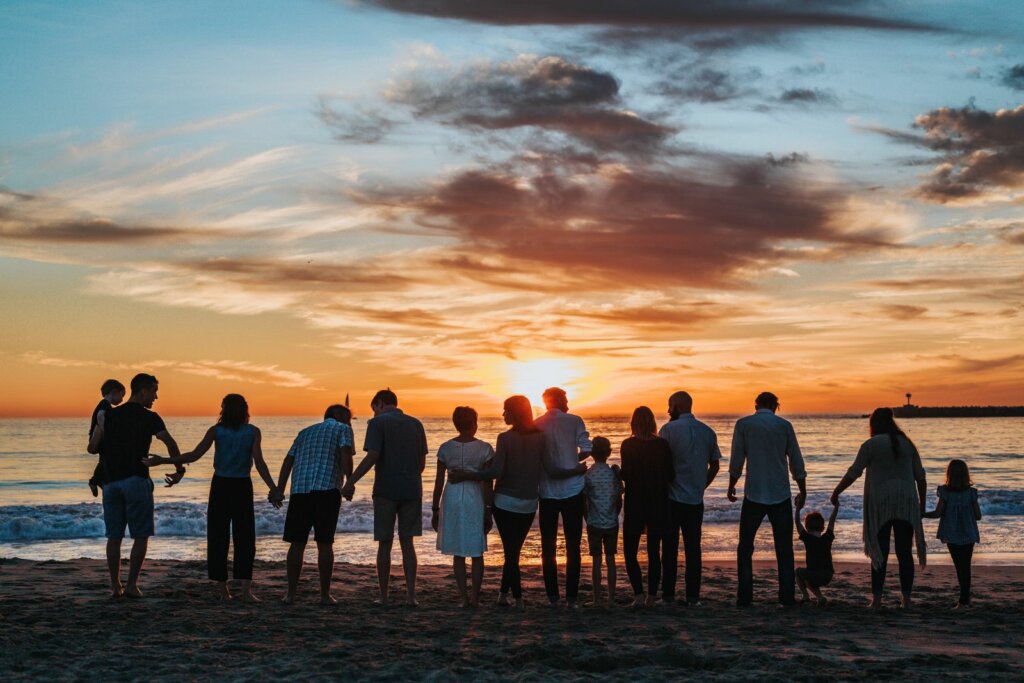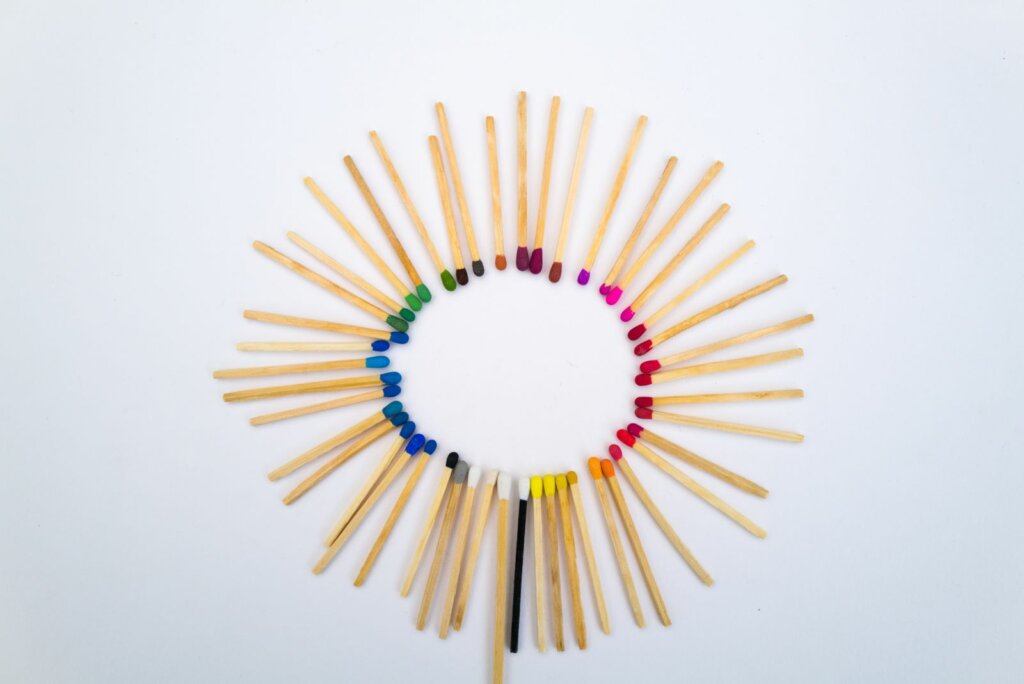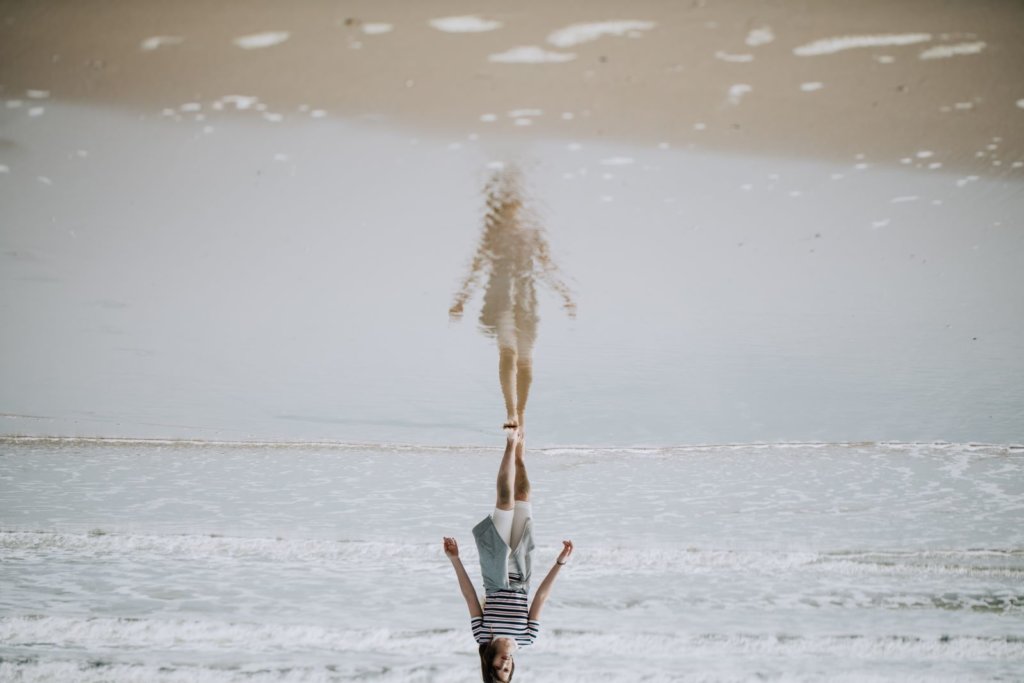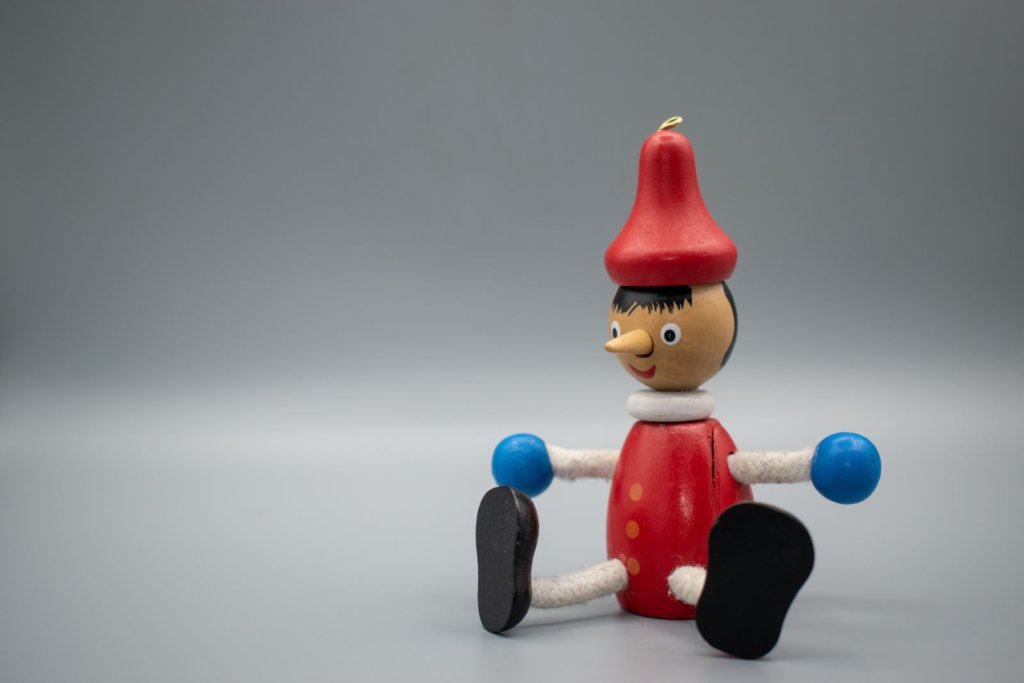I watched a clip of Netflix’s “Famous Last Words: Jane Goodall” and started tearing up. That woman was an icon, a messenger of hope, and someone who remained consistent until her dying breath. She exemplified neohumanism, a concept in my spiritual tradition, that begs the question, “What is the boundary of your identity?”
Neohumanism encourages bridge building not only with other people, but also with plants and animals. For Jane, she saw animals not as heartless brutes, but as beings that have rich inner lives just as humans do. They cry, experience joy, and have other emotions. From a Mongabay news piece I read, “She blurred the categorical wall that placed humans above other animals. Her work became foundational not only for primatology, but for animal welfare and environmental ethics.”
But she wasn’t an animal rights activist who said, “Screw all the humans! You’re terrible!” Instead, she tried to connect with people she didn’t see eye-to-eye with. She said, “If you don’t talk to people you disagree with, how can you expect them to change?” She understood that being a purist or isolating yourself from others only creates more isolation, and what this planet actually needs is people working together.
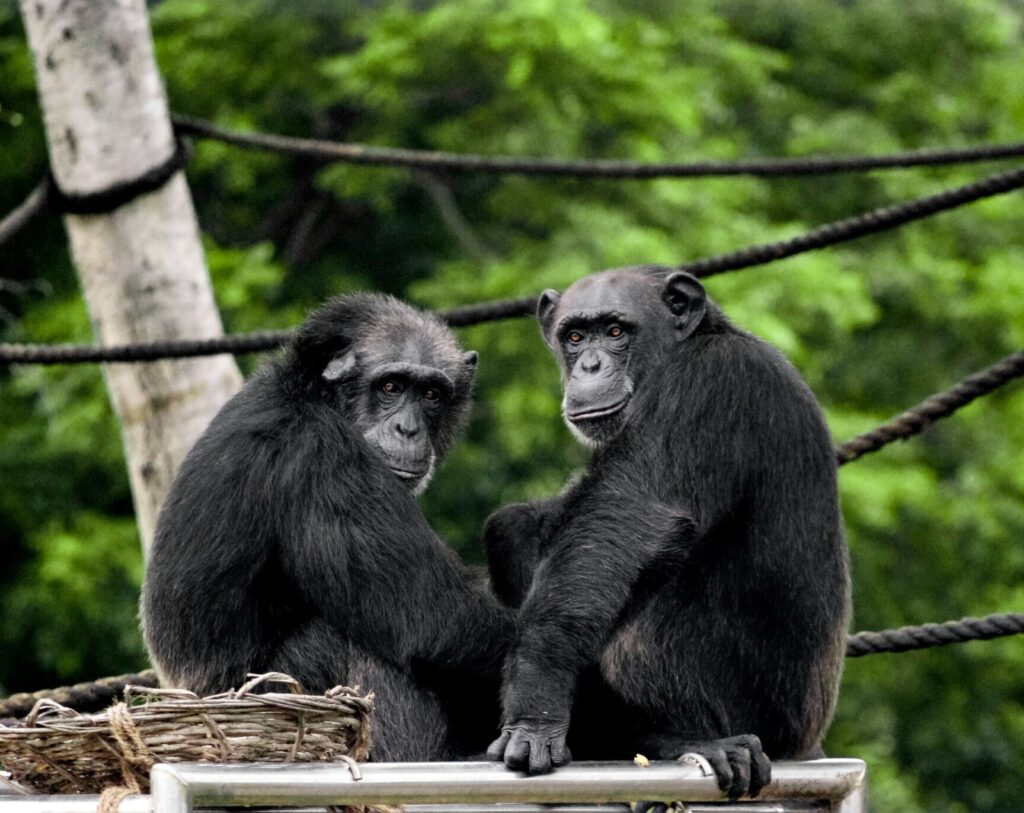
In honor of Jane, of course. Photo by Satya deep on Unsplash
Jane also followed up her words with actions by creating Roots & Shoots, a youth action program that empowers young people to be the change in their communities. It spans more than 140 countries and has projects ranging from recycling drives and community gardens to tree-planting campaigns and animal rescues. Underpinning the youth movement, and Jane’s ethos in general, is that every action matters.
“You cannot get through a single day without having an impact on the world around you,” Jane often reminded her audiences. “What you do makes a difference, and you have to decide what kind of difference you want to make.”
I keep thinking about that quote, and like I wrote about last week, that each of us has influence even if we’re not an influencer. If we accept it as fact that we impact the world every single day, what kind of impact do we want to have? Some people are hellbent on impacting the world negatively by cutting healthcare access, deporting immigrants, or laying off workers so they can further line their own pockets.
In response to those people hellbent on negatively impacting the world, it feels like everyone and their mother is asking, “How are you working to stop them?” I have idiopathic hypersomnia and panic in crowds, so I’m not capable of being in the streets. I can’t join the protests, the marches, the trainings. And I have a loooot of feelings about that. But that doesn’t mean I’m not impacting the world around me. It doesn’t mean I’m not making a contribution.
I’m not a perfect person. I make mistakes. Sometimes I’m the villain in someone else’s story. But more often than not, the contribution I make is one of kindness, empathy, and authenticity. I may not speak in front of millions, but I’ll chat with a friend for an hour so she feels seen and heard. I may not join a protest, but I’ll show up for my friend’s film premiere. Even though those actions are small, they, too, make a difference. And they’re the sort of difference I want to make.
I dream of a world where we all embody the virtues Jane Goodall emphasized as much as we can. A world where we continue to have hope, show compassion, and see every being as worthy of love and respect. A world where we understand every day we make a difference, and we consciously choose what kind of difference we want to make.
Another world is not only possible, it’s probable.
Many cultures, especially in the West, treat Earth as a set piece, the stage upon which life happens. There’s nature and then there’s humanity. We’re seen as separate and dominant. But as former NASA scientist James Lovelock stated in the 70s with the Gaia Hypothesis, we are not managers of the planet, we are the planet. We are a piece of the complex, self-regulating system. For instance, plants breathe in the carbon dioxide we emit and we breathe the oxygen they expel. They need us and we need them.
When Lovelock’s hypothesis first came out it was met with derision but not so anymore. The earth system scientist Tim Lenton at the University of Exeter said he and a number of scientists “now think in terms of the coupled evolution of life and the planet, recognizing that the evolution of life has shaped the planet, changes in the planetary environment have shaped life, and together they can be viewed as one process.”
Darwin said organisms compete and adapt to environments. Only the strongest survive and all that. But now, the new perspective is organisms continuously reshape their surroundings with intricate feedback loops of transformation. Climate & Capital Media Founder Peter McKillop writes, “This isn’t environmental romanticism. It’s a scientifically grounded understanding of planetary dynamics that demands a complete reimagining of our economic, technological, and social systems if we are to survive.”

We are nature and nature is us. Photo by Jon Flobrant on Unsplash
So no pressure or anything – just the survival of our species. It seems like a tall order but it all starts with a mindset shift. How often do we think of nature as being “out there”? A place we go to? As if we could ever get away from nature! Not only is the very ground we stand on nature, but we are nature too. Our bones are made of minerals that we obtain from the environment. Most of the elements in the human body, like carbon, oxygen, calcium, and iron, were created in stars. We, ourselves, are stardust.
We are not separate at all. The entire cosmos is like a spider web and if you pull on one thread, it vibrates the rest of them. I have a friend who acknowledges this every morning in his prayers. He says, “I am eternally grateful to be an integrated particle in the infinite universe of your wisdom and will, and to live in your abundance and prosperity receiving your guidance, strength, mercy, and protection.” I can’t help but wonder what would the world be like if we all felt this way? That we are an integrated particle that is only one part of a whole. What would the world be like if we remembered that nature isn’t “out there” or somewhere to get to but rather, we, ourselves, are nature?
This is essentially the point of my meditation practice, to remember not only the connection but the unity with all of creation. I am nature, nature is me. I am other humans, other humans are me. I am the Divine Beloved, the Divine Beloved is me. I am not separate from anything and nothing is separate from me. I frequently get amnesia on this point but that’s also why I meditate every day, not only so I remember the concept but act on it. Because when I do, I treat everyone and everything with more care, love, and respect and that’s something we could all use more of.
I dream of a world where we remember we are an integrated particle in this universe. A world where we understand we aren’t separate from anyone or anything and nothing is separate from us either. A world where instead of thinking of nature as being something “out there” we remember we are nature and act accordingly.
Another world is not only possible, it’s probable.
Lately, I’m on a genealogy kick trying to suss out who I’m related to and how. It’s endlessly fascinating because it’s a puzzle but also a web. As you know, there are many offshoots of a family tree — aunts, uncles, cousins — who all have their own direct family lines. But what’s even more interesting is that we’re all related, literally.
If you go back far enough, you reach a date when family trees share not just one ancestor in common but every ancestor in common, which is called the genetic isopoint. In other words, the family trees of any two people on the earth now, no matter how distantly related they seem, trace back to the same set of individuals. Geneticist Adam Rutherford told Scientific American, “If you were alive at the genetic isopoint, then you are the ancestor of either everyone alive today or no one alive today.” The genetic isopoint occurred somewhere between 5300 and 2200 B.C., according to statistical calculations.
“In relation to race, it absolutely, categorically demolishes the idea of lineage purity,” Rutherford added. That’s because no person has forebears from just one ethnic background or region of the world. Instead, we are all related. The poet Satyendra Dutta expresses this beautifully when he says, “There is only one race in the entire world, and the name of that race is the human race. We are bound together with the same breast milk of Mother Earth, and the same sun and moon are our common companions.”
Exactly! The same sun, moon, and stars are our common companions and we are all living on the same planet Earth. Yet somehow we forget that. We get caught up in dividing ourselves into this group or that. We say, “I’m not like you,” but is that really true? Don’t we all have the same feelings and needs? Aren’t we more alike than we are different? What do we get by focusing on differences, anyway?
My spiritual teacher said, “The opportunists tried in the past, are trying at present, and will try even in the future to fulfill their narrow desires by keeping the human race disunited. By severely reproaching this opportunistic craftiness through your noble deeds, you draw nigh the unknown strangers living far away and build a healthy world-based human family. Ignoring the brute forces, the sky-kissing arrogance, hypocrisy, immorality, and glib outbursts of the conceited people, go ahead towards your cherished goal.”
The cherished goal isn’t to become a billionaire, by the way. As you likely guessed, it’s to feel the sweet union between yourself and something greater than yourself. This is a quote from my spiritual teacher, after all.
Learning about genealogy reminds me we’re a universal family, quite literally. We are like a garden filled with numerous flowers, but ultimately all a part of the same garden. Like flowers, on the surface, we have different petals, different leaves. Some of us require more water and some of us require less, but we are all flowers. In other words, we’re all humans a part of the same race.
I dream of a world where we treat each other like family. A world where we extend care and appreciation to strangers because we recognize, they, too, are our siblings. A world where we understand there’s only one race, the human race. A world where we embrace the idea of a literal universal family.
Another world is not only possible, it’s probable.
I, like many, have a lot of feelings about the smattering of recent U.S. Supreme Court decisions. And then there are the bills targeting the LGBTQIA+ community. The trend I’m noticing is more divisiveness, more separation, and more hate, frankly. Is this what human beings are destined for? Are we doomed to splinter off into smaller and smaller groups and engage in constant “us versus them” culture wars?
Maybe yes, maybe no but according to neuroscience, our brains are wired for connection and cooperation. Neuroscientist Matthew D. Lieberman, director of UCLA’s Social Cognitive Neuroscience Lab wrote a book called Social: Why Our Brains are Wired to Connect. He says, “To the extent that we can characterize evolution as designing our modern brains, this is what our brains were wired for: reaching out to and interacting with others. These are design features, not flaws. These social adaptations are central to making us the most successful species on earth.”
There’s also a study out of Emory University led by Gregory Berns who learned that when pairs of volunteers cooperated with one another, the reward circuits of the brain were activated. These are the same regions that are activated by drugs. The activation happened only when paired with a human – when the study participants were paired with a computer, they didn’t have the same response.
Volunteers were hooked up to an fMRI scanner and invited to play the “Prisoner’s Dilemma” game. Each volunteer pressed a button to indicate when they were ready to play, and then each simultaneously pushed another button to indicate if they wished to cooperate with, or betray, the other player.
The most common outcome was volunteers mutually cooperated with one another. Berns suggests people are hard-wired to cooperate because the brain associates cooperation with reward. Others are quick to point out that correlation is not causation but I’m inclined to agree with Berns because regardless of whether it’s due to our brains or something else, we want to connect with other people. We are wired for oneness.
What so often gets in the way is exactly what we’re seeing now: socio-sentiment. Socio-sentiment means loyalty to a particular social group to the exclusion of other groups. You already know what a world dominated by socio-sentiment looks like – we’re living in it. What’s the solution?
My spiritual teacher says, “To liberate society from this unbearable situation, consciousness will have to be aroused among the people; their eyes will have to be opened by knowledge. Let them understand the what’s, the why’s, and the where’s. Thus, study is essential, very essential.”
In other words, biologically, we want to connect with others, we’re made for connection, and what’s getting in the way is cultural conditioning that says this group is good and this group is bad. We all do this. The challenge then is to see every person as a human being, not a label. Personally, I do this by practicing empathy and guessing what someone else is feeling and needing. And when I do, I feel even more connected. It’s almost as if my brain is wired for oneness and spurring me on.
I dream of a world where we promote unity instead of division. A world where we recognize we are all humans with the same feelings and needs. A world where we stop propagating socio-sentiment and instead recognize we’re all in the same group. A world where we remember we are wired for oneness.
Another world is not only possible, it’s probable.
I feel unsettled after learning what happened to novelist Salman Rushdie on Friday. If you’re unaware, he was stabbed as he prepared to give a lecture in upstate New York. He suffered wounds to the neck and abdomen and is thankfully on the road to recovery, according to his agent.
It’s believed the attack is in connection to Rushdie’s late-80s book The Satanic Verses, which many Muslims consider blasphemous as it mocked or at least contained mocking references to the Prophet Muhammad and other aspects of Islam. There’s also a character based on the Supreme Leader of Iran and after it was published, Iranian leader Ayatollah Ruhollah Khomeini issued a fatwa, or edict, calling for Rushdie’s death.
I’m upset by multiple things. One, the stabbing occurred during a lecture, an event you would think was safe and peaceful. Two, multiple people were so enraged by words, not actions, words, they sought to kill someone. That’s pretty intense. And problematic because to quote Rushdie, “The moment you say that any idea system is sacred, whether it’s a religious belief system or a secular ideology, the moment you declare a set of ideas to be immune from criticism, satire, derision, or contempt, freedom of thought becomes impossible.”
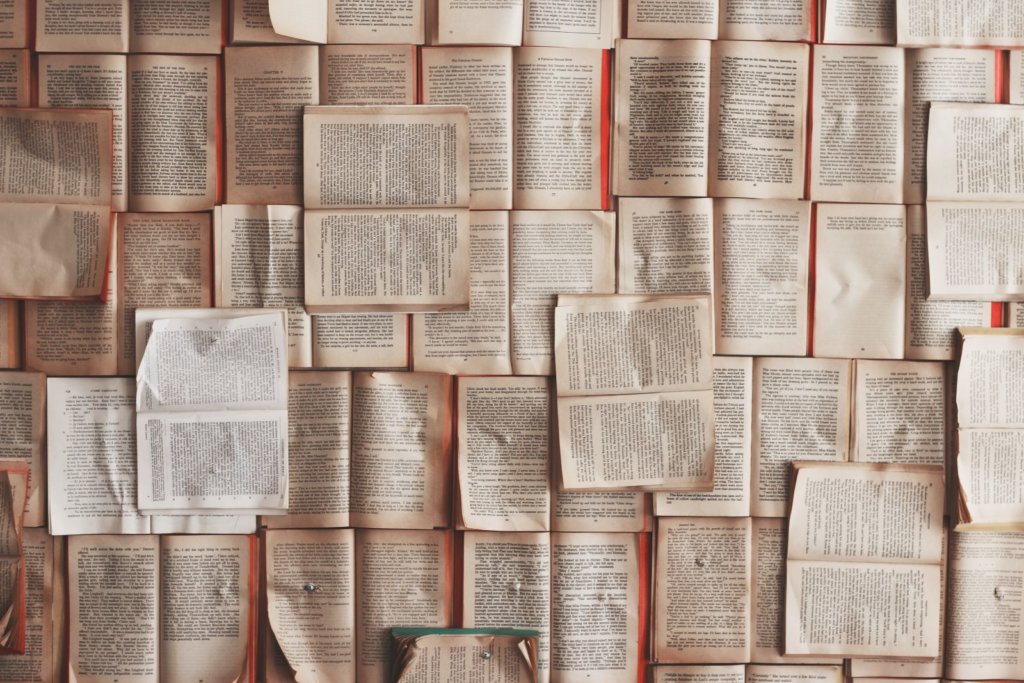
Critical thinking is key. Photo by Patrick Tomasso on Unsplash
Freedom of thought becomes impossible because instead, people sink into dogma. Dogma is thinking without logic or reasoning. And once a person does that, they start doing something because someone else told them to, which is dangerous because they can become easily manipulated by others. They fall prey to schemes and cause real harm to themselves and others.
Dogma can also be the reverse, by the way. It can be disregarding what a certain person, group, or organization says just because of their identity. My spiritual teacher says, “[D]ogma has had an extremely negative influence on ordinary people .… By arousing narrow sentiments, the adherents of dogma hope to fulfill their selfish aspirations … The followers of dogma do not want people to tread the path of rationality … The worst propounders of dogma – the kings of dogma – do not want people to develop mental clarity. They do not want the penetrating illumination of the sun’s light to pierce through the mists of dogma. They do not want people to bathe in the radiant light of the day and stand under the clear, unclouded sky.”
It’s also the case we fall prey to dogma internally, without someone acting as a puppeteer. We see this on social media with “stans,” or super fans that are overzealous and obsessive. They think the person they follow can do no wrong, and when the person inevitably makes a mistake, because, hi, they’re human, some stans dig their heels in and defend the person. People who aren’t super fans will engage in a takedown and explain why the person is trash and should be “canceled” or stop receiving support. From Merriam-Webster, “The reason for cancellation can vary, but it usually is due to the person in question having expressed an objectionable opinion, or having conducted themselves in a way that is unacceptable so that continuing to patronize that person’s work leaves a bitter taste.”
I understand that reaction and sometimes I think it’s warranted. However, this approach misses nuance. Every person is both a hero and a villain. Every person is capable of good and evil. It doesn’t make sense to follow a person as if they are an infallible, perfect human being. I know it’s funny to quote my spiritual teacher again here, but even he said, “Even if a young boy says something logical, it should be accepted, and if the Supreme Creator Brahma says something illogical, it should be rejected as rubbish.”
I agree. Use your brain. Dogma can be alluring because it’s easy and doesn’t require effort, but you have a brain and if you don’t use it, that’s not beneficial for anyone.
I dream of a world where we recognize no idea, person, or belief system is above scrutiny. A world where we don’t accept someone else’s words hook, line, and sinker, no matter who they are. A world where we use logic and reason to make the world a better place and bathe in the radiant light of the day.
Another world is not only possible, it’s probable.
Facebook keeps showing me pictures from trips I took to Europe years ago, including one from Denmark in 2016. What I remember about that trip, other than laughing and exploring the country with a dear friend, is how everything reminded me of something else.
For instance, gazing out a train window, I could have sworn I was in Iowa, not Denmark, because the land was so similar. At the beach, the combination of the sand’s color, dunes, and water reminded me of the Outer Banks in North Carolina. I know there are places in Denmark that are completely unique, but all in all, whenever I travel, I’m reminded everything is more the same than it is different. Yes, the landscape, but also the people.
I may not speak the same language as someone else, but we both care about our friends and family. We both want to be happy, to feel secure in where we live. We all have the same needs, and in times like these, all times really, it’s important to keep focusing on what binds us.
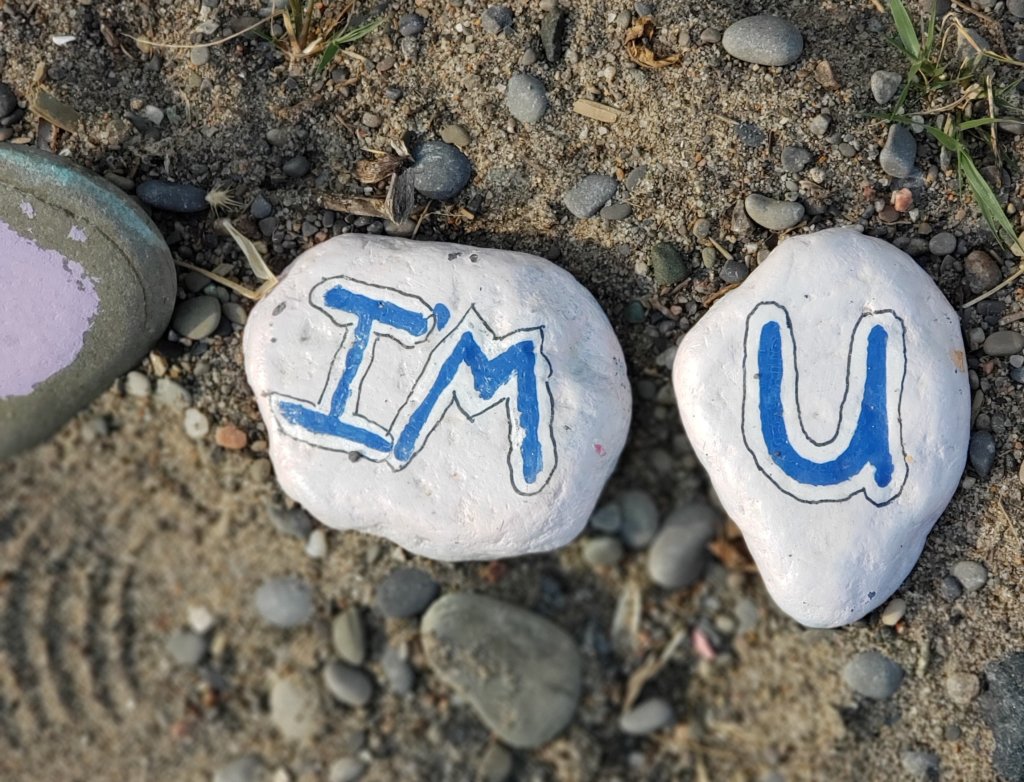
These rocks say it all. Photo by Phyllis Poon on Unsplash
In our world, there are some people who are trying to create division. There are some people who use one group or another as a scapegoat for the world’s problems. They speak in broad strokes like, “All of these people are like this,” or “Those people are like that,” which is dangerous. When we enhance separateness, that creates conflict because at the root of mistreatment is an “us” and “them” mindset. It’s easier to justify atrocious acts when a person becomes someone who is “not like me.” Or even worse, not human.
My spiritual teacher corroborates this and says “us” and “them” thinking makes different groups become more violent toward each other. We’ve seen this over and over again. Frankly, haven’t we had enough? I’m not so naïve to think there will never be any conflicts in the world, but I think we start moving in a better direction when we realize, to paraphrase Shakespeare, that we all bleed when we are pricked, that we all feel pain and sorrow, that we all want to be happy and to realize our dreams. We want the same things even if how we go about achieving them is different.
I’ve used this quote before but it continues to be relevant. My spiritual teacher adds, “Human society is just like a garland which is made of different types of flowers, woven together by one common thread. The overall beauty of the garland is dependent upon the beauty of each flower. Likewise, each strata of society must be equally strengthened if we are to maintain the unity and solidarity of society.”
We must all be lifted up. We must support one another. We must see each other as people who are just like us if we have any hope of maintaining unity and solidarity. Peace comes from a place of connection and that starts with recognizing we are more similar than different.
I dream of a world where we recognize what unites us rather than divides us. A world where we focus on our similarities, not our differences. A world where we remember people are people everywhere. A world where we work together to create as much peace as we can.
Another world is not only possible, it’s probable.
As we celebrate Dr. Martin Luther King Jr.’s birthday here in the U.S., I keep thinking about one of my favorite quotes of his. There are many because the man was an eloquent speaker, but in 1963 he said, “Injustice anywhere is a threat to justice everywhere. We are caught in an inescapable network of mutuality, tied in a single garment of destiny. Whatever affects one directly, affects all indirectly. Never again can we afford to live with the narrow, provincial ‘outside agitator’ idea. Anyone who lives inside the United States can never be considered an outsider anywhere within its bounds.”
It’s an interesting concept, and one that continues to be relevant, this notion of “outsider” and how we apply justice to anyone we perceive to be an outsider. Did you know it’s been 20 years since the first detainees arrived at Guantánamo Bay? And that those prisoners were subjected to torture? Only 39 prisoners remain and more than a dozen of them have yet to face charges. They have been dubbed “forever prisoners” by some Democrats. The cost of operating the prison is about $13 million per prisoner every year, according to a Business Insider article! Are you freaking kidding me? I could think of a lot of better uses for $13 million per person.
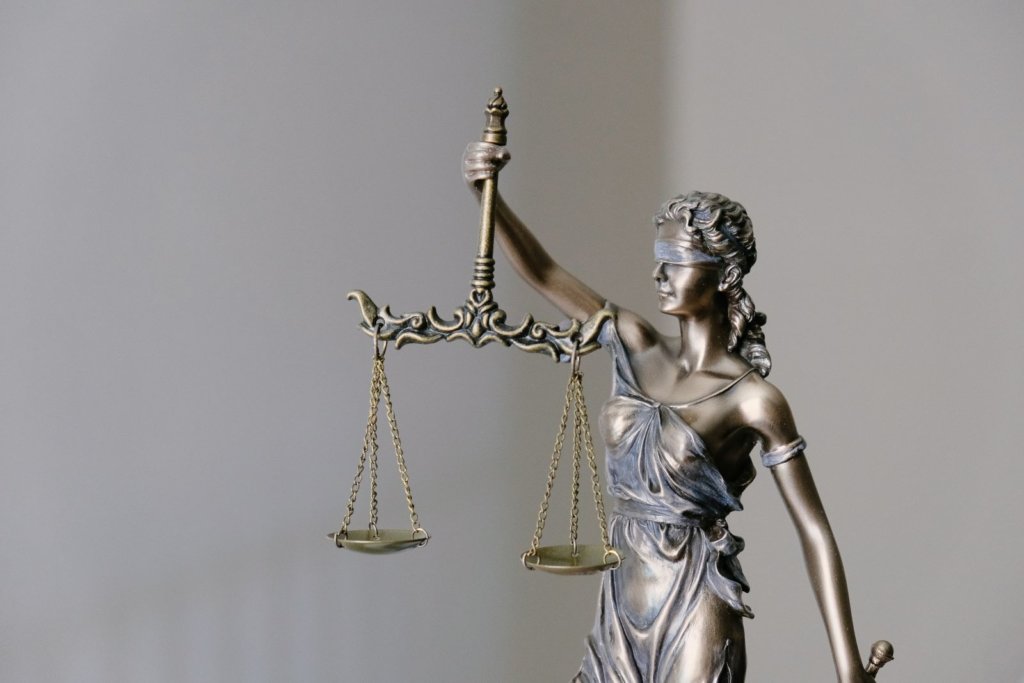
Justice is supposed to be blind, but is it? Photo by Tingey Injury Law Firm on Unsplash
And even if you’re saying, “Yeah but they’re terrorists! They need to be held captive!” The cost to house a single prisoner in California is more than $75,000, according to the LA Times, which is still more than a year at Harvard. Clearly there’s a lot of injustice, a lot of mismanaging funds, and yet a small group of people continue to let incidents like these occur.
It brings to mind an excellent article I read on LitHub by Rebecca Solnit posted in 2018 about how there’s a myth surrounding the “real” America. She wrote:
“[I]n the news and political life, we’re still struggling over whose story it is, who matters, and who our compassion and interest should be directed at.
“The common denominator of so many of the strange and troubling cultural narratives coming our way is a set of assumptions about who matters, whose story it is, who deserves the pity and the treats and the presumptions of innocence, the kid gloves and the red carpet, and ultimately the kingdom, the power, and the glory. You already know who. It’s White people in general and White men in particular, and especially White Protestant men, some of whom are apparently dismayed to find out that there is going to be, as your mom might have put it, sharing. The history of this country has been written as their story, and the news sometimes still tells it this way – one of the battles of our time is about who the story is about, who matters and who decides.”
Precisely. So much of justice and injustice is tied to who matters and who decides. If Black people don’t matter, then it’s fine to kill them in the streets. If terrorists don’t matter, it’s OK to torture them. But who exactly is deciding they don’t matter? And why is that those people are in charge? The reality is the White population in the U.S. is declining and other races are increasing. Where I live, the majority of people are not White. To my mind, that means decisions being made about policies and procedures should take into account that diversity, should recognize this country belongs to everyone who lives here. In essence, to bear in mind what Dr. King mentioned so long ago: that injustice anywhere is a threat to justice everywhere.
I dream of a world where we treat all human beings with love and respect. A world where we value justice not only in word but in action. A world where we celebrate and protect human diversity while also seeking to transcend divisions. A world where we honor Dr. King’s legacy by bringing his dream into reality.
Another world is not only possible, it’s probable.
Something I’ve heard before is that physical health is a privilege. When people said that, I brushed it aside because I thought they meant health is something to be grateful for, a blessing, a gift. But now, as I approach my 37th birthday, I recognize physical health is an attribute to be grateful for yes, but it’s also a privilege similar to how we talk about White privilege. Meaning, something most people don’t think about, or take for granted, unless they’re in the group that doesn’t have it.
There’s a lot to say about White privilege but to summarize, it’s the obvious and less obvious passive advantages that White people may not recognize they have. It’s moving through the world with relative ease. Swap out “White” for “healthy” and the privilege is similar (similar but not the same). This post is focusing specifically on physical health, but there is also mental health privilege.
For someone like me – a person recovering from adrenal fatigue, a sleep disorder, digestive issues, a spoonie – I’m not able to navigate the world with relative ease. I’m forever worried my small business will crumble because I can’t work full-time due to limited energy. And supporting myself with a part-time job is challenging, which I know, because I did it for years.
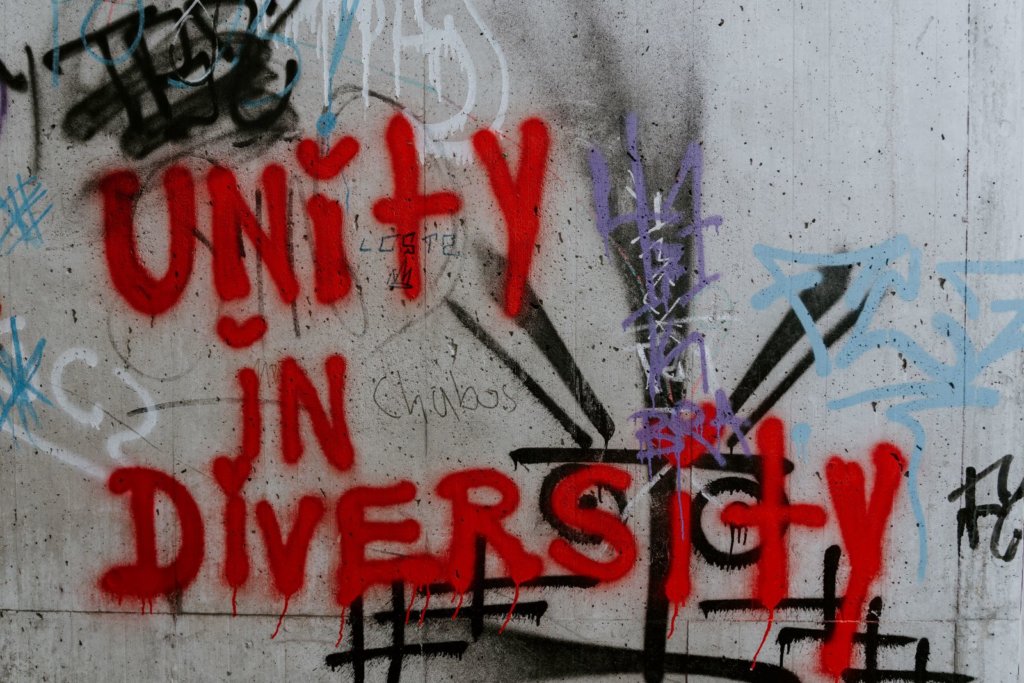
This graffiti says it all. Photo by Claudio Schwarz on Unsplash
In the days before my birthday, I’m crying because I feel like I’m getting older without ever having been young. For only three years in my 20s did I feel mildly energetic, healthy, vibrant, pleased with how my body looked and functioned. The rest of my life has been one issue after another after another. And as I’m crying about my own health challenges, I think about friends of mine, or people I know, who have chronic fatigue syndrome, fibromyalgia, Crohn’s disease, thyroid issues, etc., and I realize we’re sold this image of what is “normal,” of how our bodies are “supposed” to be. Not unlike the ideals sold to us via White supremacy like beauty standards and the body mass index.
Thinking about all of this, I really get that health is a privilege. Not everyone is given health. We aren’t all born with perfectly functioning bodies that slowly deteriorate over time as we age. No. Some of us never have perfectly functioning bodies. Some of us have to take medication and eat certain foods and take daily naps to even approach what others have naturally.
Now instead of feeling sad, I’m angry because I’ve bought into this message about an ideal body – and I’m not talking shape and size – that is literally not achievable for some people. The kicker though is our bodies can change drastically from one year to the next depending on a multitude of factors – some of which we control. I personally spend an inordinate amount of time on those factors. A soul sister tells me, “I don’t know of anyone who takes as good of care of their body as you do.” And yet, all of that care barely moves the needle on my health. And I’m lucky because I don’t live with constant pain unlike some people!
It seems to me we’re in the age of celebrating diversity with race, gender, sexual orientation, and cognitive function (in some circles). It’s time to welcome in the body too. Not only when it’s obvious, but when it’s subtle.
My spiritual teacher says, “Human society is just like a garland which is made of different types of flowers, woven together by one common thread. The overall beauty of the garland is dependent upon the beauty of each flower. Likewise, each strata of society must be equally strengthened if we are to maintain the unity and solidarity of society.”
To me that means normalizing some people have health challenges in the “prime” of their life. It means recognizing some people never experience relative ease in how they move through the world on a physical level. It means making room for and supporting people like me who have invisible illnesses. It means not relegating us to the shadows or acting like we’re an anomaly because we’re not. We’re just as normal as anyone else.
I dream of a world where we create space for all people and not act like some are part of the “in” crowd and others are not. A world where we recognize diversity is what makes human society beautiful. A world where we understand that uniqueness is normal and in turn means it’s important to create a more accessible, supportive world for us all.
Another world is not only possible, it’s probable.
I keep thinking about the murders in Atlanta and what I can personally do other than what I’ve already done, which is to donate and speak out. What came to mind is writing on worldview. How you view the world is how you act in the world. If other people are less than, inferior, objects that exist solely for your pleasure, then it’s not hard to murder them or hurt them in some other way. The reverse is also true: If other people are equal to you, fellow human beings that have the same needs that you do, you’ll treat them with respect. Furthermore, the reality is we all need each other, we all have something special to give.
This concept is illustrated so beautifully in Gary Ferguson’s book The Eight Master Lessons of Nature. He writes about how each wildflower has its own strength that contributes to the whole. Some wildflowers have deeper roots that help them survive during drought periods and others have waxy leaves that allow them to contain moisture.
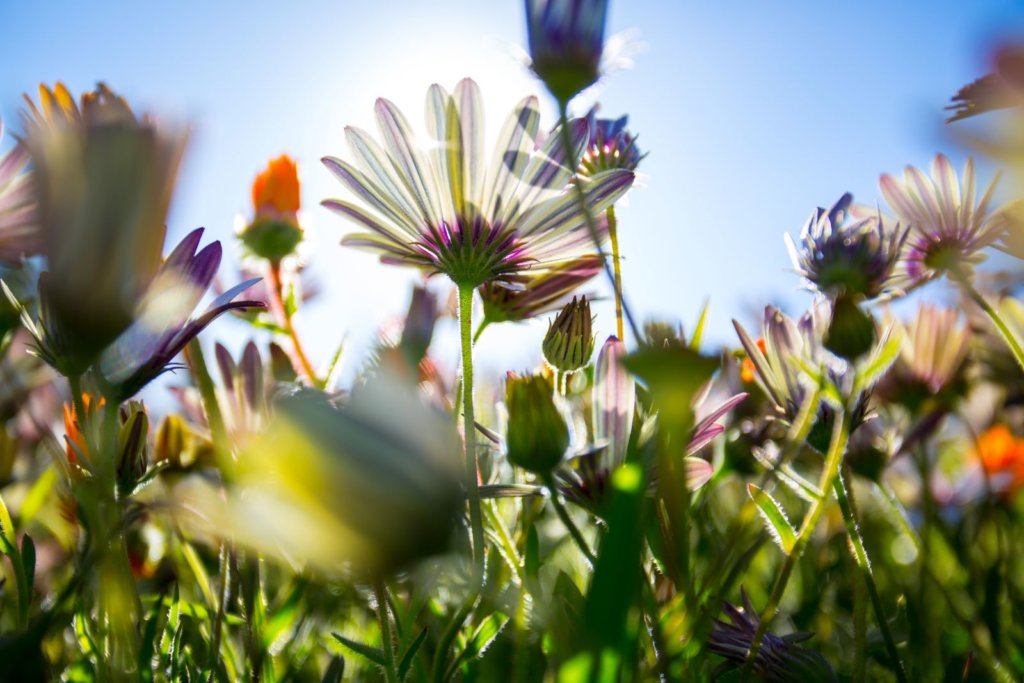
Variety is the spice of life for nature too! Photo by Gaston Roulstone on Unsplash
Every flower has a different survival strategy and together they keep the ecosystem flourishing. If all the flowers on a steep mountain slope perish, the soil would erode, the butterflies would flee, the elk would wander away, and the area would become a dead zone. Living among diversity is what keeps the area healthy. In other words, homogeneity spells death. That’s true not only for plants, but for humans too.
My spiritual teacher says:
“You should remember that human life is not like a single flower; it is like a bouquet or a garden of flowers blooming with many varieties of flowers. And this variety of blossoms adds to the collective beauty of the garden. Had there been only magnolia graniflora or one variety of rose only blooming in the garden, although that single flower might be very attractive, still the garden as a whole would not be very lovely. A garden is all the more beautiful because of the flowers of various types and hues.
“Similarly, we human beings must also move forward while maintaining a harmonious adjustment among all the diverse aspects of individual and collective life. We must discover unity in the midst of colorful diversity. Not only will we realize this in the future, we are realizing it even today, and thus we have been able to consolidate even our limited power. And you know that even a little power, if consolidated, becomes stronger than even a mighty force.”
We are stronger together and we are stronger diversified. There’s room not only for one kind of person, but for all people. And instead of trying to assert dominance of one group or another, let’s reminder that all of us together are what keep this planet and our society alive.
I dream of a world where we treasure the contributions that we each make. A world where we value diversity. A world where we understand we are stronger because of it. A world where we remember what the wildflowers teach us.
Another world is not only possible, it’s probable.
